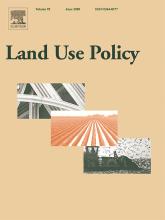Resource information
Understanding stakeholder power relations—such as between land sellers, land buyers, and local governments—is crucial to understanding Land Value Capture (LVC). While scholars have focused on stakeholder relationships through approaches such as stakeholder salience, stakeholder interaction, stakeholder value network, and stakeholder multiplicity, much research either places insufficient focus on power or only stresses partial attributes of power. As a result, the role of power relations among key stakeholders in LVC remains insufficiently explored. Our contribution is a new analytical framework for stakeholder power dynamics surrounding LVC. This provides an empirical analysis by comparing the public (China) and the private (U.S.) dominant regimes, through the perspectives of power direction, strength, and mechanism. To conceptualize the three perspectives of power in LVC, we constructed an analytical matrix and then categorized data in terms of stakeholder, space, and time perspectives. Based on empirical findings, four emerging dilemmas shed light on consequences for LVC policy making as well as areas in need of further research.


